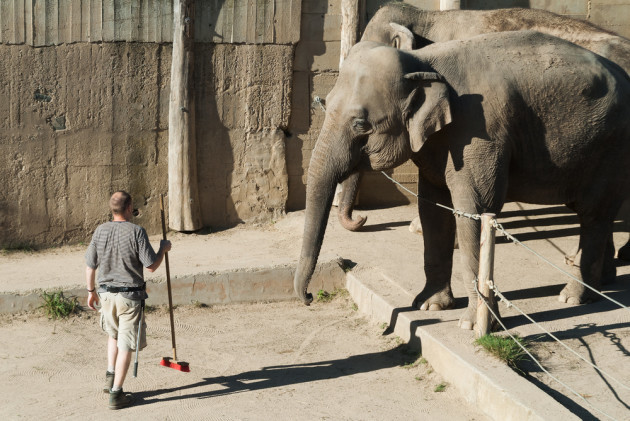"There's more to life than being happy": Why the key to a fulfilled life could be 'meaning'
That’s according to Emily Esfahani Smith, author of a new book on the subject.

LIFE HAS ITS ups and downs, and yet what many of us strive for is a feeling of happiness.
But what if striving for ‘happiness’ was the wrong way of going about it? What if, instead, we should be searching for meaning in our lives?
That’s the premise of a new book by journalist Emily Esfahani Smith, whose studies in the area of psychology and philosophy – as well as her Sufi upbringing – have led her to examine what really makes life worth living.
In The Power of Meaning, Esfahani Smith takes examples from published works, positive psychology and the real-life experiences of people she meets to put together a guide on living a life with meaning.
“When I started writing this book I wanted to understand how you could lead a meaningful life,” said Esfahani Smith.
For her, there are four pillars – created through data gathered from interviewees – on which meaning rests:
- Belonging
- Purpose
- Storytelling
- Transcendence
Each of these pillars is dedicated a chapter, with Esfahani Smith using real-life examples to show how each pillar contributes to meaning.
The lightbulb moment
The author told TheJournal.ie that the search for meaning in life has been a constant preoccupation for her. She wanted to think more about the fundamental questions about life – why are we here? How do we live good lives?
“That led me to study philosophy in college, but I realised philosophy isn’t so much focused on these questions anymore,” said Esfahani Smith. “It’s more technical. I felt a little bit unsatisfied in what I was learning in philosophy and I decided to be a journalist because I loved writing.”
A few years later she came across the positive psychology movement, which became particularly popular in the past decade, and which emphasises examining positive aspects of life in a scientific way.
It was somewhat of a light-bulb moment for Esfahani Smith. “Here is this field answering these questions that I have always been interested in,” she realised – which led her on to start “googling everything I could about positive psychology”. But googling wasn’t enough. Soon she had enrolled herself in a graduate programme taught by one of the best professors in the field, social psychologist Jonathan Haidt.
Being a student in the programme influenced Esfahani Smith’s work, and she started writing about the studies and concepts she was learning about. “Those articles ended up resonating with people and doing well, and one of them did particularly well, called ‘there’s more to life than being happy’.”
That led on to Esfahani Smith’s new book, which gave her more of a chance to delve into the area of meaning and happiness.
But what’s so wrong about seeking happiness?
“It seems like such a positive thing for people to aspire to,” agreed Esfahani Smith. “But in Ancient Greece, happiness was understood to be much different to what we understand it to be now. The understanding of happiness was more what we would understand to be ‘flourishing’.”
In modern life, we’ve come to take happiness, and a happy life, as meaning the “absence of negative feelings and negative states”, explained Esfahani Smith.
But pursuing happiness might not lead us to feel happier. “I do think that the pursuit of happiness has been a little bit of a distraction,” said Esfahani Smith. “I think that ultimately what people want is to lead a meaningful life, and that happiness is wonderful. But that any life that’s being fully lived will have difficult emotions – you’ll experience sadness, and grief, and stress, and effort.
And so many things we devote ourselves to, whether it’s learning a musical instrument or pursuing a certain career, or having children, are really difficult endeavours – and we pursue them anyway because they are meaningful to us.
The option is always there to give up those projects and pursue happiness without ups and downs. “But we don’t do that because these are meaningful things,” argued Esfahani Smith.
For her, this shows that “there is more to life than feeling happy”, and that if we pursue things that give our lives meaning, we will experience happiness – alongside a range of other emotions that will help us grow.
Real-life meaning
Source: Shutterstock/pp1
In the book, Esfahani Smith journeys to a number of locations around the United States to meet people who show her how important the aforementioned four pillars are.
One of those is a zookeeper called Ashley Richmond, whose days surrounded by animal waste were still ones that gave her meaning.
“[The zookeepers] spend the majority of their time cleaning up animal poop – Ashley told me 80% of her time was spent dealing with animal waste, and yet she also told me that this was her dream job. She couldn’t imagine doing anything else with her time. She considered the job as her calling. I spoke to her about why, and she said she doesn’t consider her purpose cleaning up animal waste – but her purpose is caring for the animals,” said Esfahani Smith.
I really like that example because it shows we find meaning and purpose by attaching the things we are doing to something bigger than ourselves, and sometimes we have to do things that are unpleasant to lead a meaningful life.
Edward Pruitt, meanwhile, showed her the meaning of community. He is from the small island of Tangier (it’s so small people use golf carts rather than cars to get around).
“It’s a tiny island in the middle of a bay in the US, and it’s an unusual place with a very strong sense of community,” explained Esfahani Smith, who explores in the book how difficult it can be for locals to deal with their island background when they move to the mainland.
“Edward derives a lot of meaning from the community that he experienced,” said Esfahani, who watched him give a speech on the island. He told those gathered there that when he went to college the teacher said to him “some people might wonder about this island that you’re from. It’s kind of unusual but don’t be ashamed of it. It made you who you are”.
This speech helped Pruitt to realise that his difference gave his life meaning.
The role of religion

One of the more striking elements of the book is how important religion or spirituality is to people in giving their life meaning. Given that not everyone reading the book will share an interest, or even belief, in religion or living a spiritual life, what can they learn from it?
“I think definitely people who are religious, probably it’s obvious to them why life is meaningful and for thousands of years religion has been the default source of meaning in people’s lives,” acknowledged Esfahani Smith. “And I think if you look at why it’s because those [four] pillars are present.”
Religion gives a sense of belonging and purpose, enables storytelling – usually storytelling or narrative is a big part of these two other pillars – as well as opportunities for transcendence through ritual and music.
“So I think that religion and meaning definitely go hand in hand, and I would add to that I think the question of meaning is ultimately a spiritual question if you are defining spirituality as the area of life that deals with the ultimate concerns, so the big questions of life.”
But Esfahani Smith is keen to point out that though meaning itself is a spiritual question, “I don’t think you have to have faith or be a religious person to lead a meaningful life – you can rely on the four pillars of meaning I write about.”
For Esfahani Smith, researching the book has brought her on a journey to discover just what meaning is – and she learned it’s not just in the big moments.
“I had this idea when I was younger that the search for meaning is this grand and esoteric pursuit: that you have to travel to a monastery or read lots of philosophy on how to lead a meaningful life.
What I realised is actually there are small sources of meaning all around us every day that we can tap into to lead meaningful lives and there are all sorts of small ways we can build up the pillars in our lives.
As Esfahani Smith sees it, if we familiarize ourselves with the four pillars, we can see how they fit into our lives, and which ones resonate most with us (she has a quiz on her website that she says will help with this too).
The Power of Meaning doesn’t give you a long list of ways to add more meaning to your life – so it’s less of a self-help book than one which encourages you to gently examine how you live. In a world where constant happiness is far from possible, it’s refreshing to realize that meaning can be found even in the tougher moments.
“It definitely helped me find those small sources of meaning in everyday,” said Esfahni Smith of her discoveries.
http://www.thejournal.ie/power-of-meaning-book-interview-3202193-Jan2017/
The Power of Meaning is out now, published by Penguin Random House.


Comments